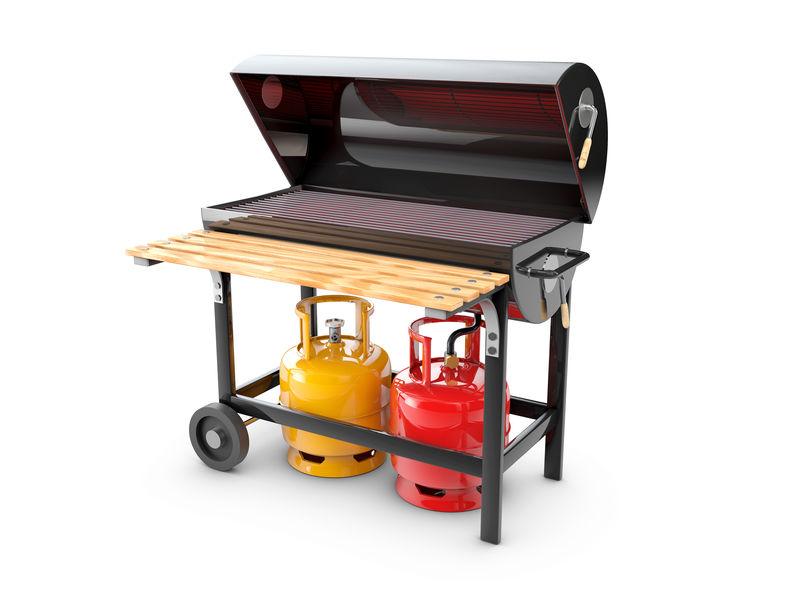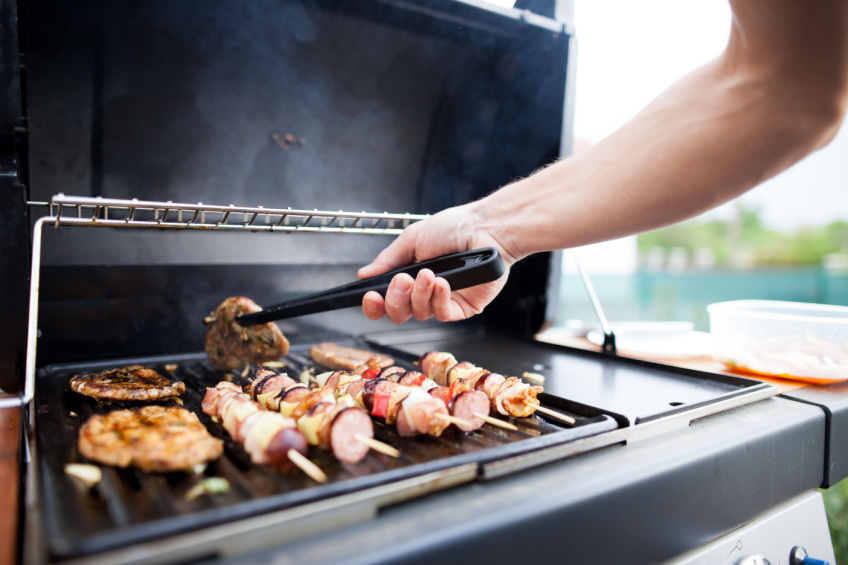This content has been archived. It may no longer be relevant

Summer is the perfect time to grill.
The hot weather gives way in the afternoon, allowing you to get out on the deck or patio and cook your favorite ingredients.
A grill will become your preferred cooking appliance during the warmer months of the year.
Cooking with gas is clean and efficient, and propane prices are excellent at the moment.
You can cook all summer long without needing to spend a lot on fuel.
When cooking with propane, it’s important to follow all manufacturer instructions to keep you and your family safe.
You should also know where to store a propane tank in summer.
Propane tanks are made to be safe and durable but you must still take precautions.
Here’s everything you need to know for a safer grilling season.
Storing a Propane Tank Outside
Storing a propane tank outside is generally safe, but it’s important to follow some guidelines to ensure that you’re storing the tank in a safe and responsible manner.
Here are some tips.
- Choose a safe location. The tank should be stored in a well-ventilated, level area that is at least 10 feet away from any building or structure. The location should be away from any ignition sources such as open flames, electrical outlets, or motors.
- Protect from the elements. The tank should be protected from direct sunlight, rain, and other extreme weather conditions. You can use a cover to protect it from the elements.
- Keep the valve closed. When not in use, the valve on the propane tank should be kept closed to prevent leaks.
- Store upright. Propane tanks should always be stored in an upright position. If a tank is stored on its side or upside down, it can cause liquid propane to escape through the valve, which can be extremely dangerous.
- Securely fasten the tank. Make sure the tank is secured in place so it doesn’t tip over or roll away. You can use a chain or strap to secure it to a sturdy object.
By following these guidelines, you can safely store a propane tank outside.
Remember to always use caution when handling propane and to contact a professional if you have any questions or concerns.
Storing a Propane Tank Indoors
Storing a propane tank indoors can be dangerous and is generally not recommended.
Propane is a highly flammable gas and can pose a serious safety hazard if not stored and handled properly.
However, if you must store a propane tank indoors, there are some guidelines you should follow.
- Choose a safe location. The propane tank should be stored in a well-ventilated area with good air circulation. The storage area should be dry, cool, and away from any sources of ignition such as electrical appliances, open flames, or motors.
- Use a propane cabinet. If possible, use a propane cabinet that has been approved by the National Fire Protection Association (NFPA) for storing propane tanks indoors. The cabinet should have proper ventilation and be securely fastened to the floor or wall to prevent tipping.
- Keep the valve closed. When the propane tank is not in use, always make sure the valve is closed tightly to prevent any propane from leaking.
- Temperature of the environment. Your propane tank should be stored in a cool and dry environment where the temperature doesn’t exceed 120°F.
- Monitor the tank. Check the propane tank regularly for signs of damage or leaks. If you notice any damage, corrosion, or leaks, do not use the tank and contact a professional immediately.
- Follow local regulations. Check with your local fire department or building inspector for any regulations or codes that may apply to indoor propane storage.
It’s important to note that storing propane tanks indoors can be dangerous and should only be done as a last resort.
If possible, store propane tanks outside in a safe and well-ventilated location.
If you have any concerns or questions about storing propane tanks, contact a professional for assistance.
How Long Can You Store a Propane Tank Outside?
Propane tanks can be stored outside for long periods of time if they are stored properly.
Propane doesn’t expire, but components like the valve can fail over time.
Here are TWO general guidelines for storing propane tanks outside.
- Check the date of manufacture. Propane tanks have a date stamp on the collar that indicates when the tank was manufactured. The lifespan of a propane tank is generally around 12 years from the date of manufacture.
- Inspect the tank regularly. Check the propane tank regularly for signs of damage, corrosion, or leaks. If you notice any issues, do not use the tank and contact a professional immediately.
In general, if a propane tank is well-maintained and stored properly, it can last for many years.
However, if you have any concerns about the condition of your propane tank, contact a professional for assistance.
In addition to knowing where to store a propane tank in summer, you should also know when to have your tank inspected.
If it’s a portable tank, have it inspected after it has been stored for more than 12 months.
Take it to the exchange station where it was picked up and ask an attendant for help.
If you have large standing propane tanks (the non-portable types used for outdoor and indoor appliances), these should be inspected every three years.
How to Check a Propane Tank for Leaks
Checking a propane tank for leaks is important to ensure your safety and the safety of those around you.
Here’s how to check a propane tank for leaks.
- Turn off all propane appliances. Before checking for leaks, turn off all propane appliances and make sure there are no open flames nearby.
- Apply a propane leak detector solution. Apply a solution of 50% water and 50% dish soap to the propane tank valve, regulator, and hose connections.
- Check for bubbles. Turn on the propane tank valve and check for bubbles around the valve, regulator, and hose connections. If bubbles form, it indicates a leak.
- Listen for hissing sounds. Listen for any hissing sounds around the propane tank. If you hear a hissing sound, it could indicate a leak.
- Use a propane gas detector. You can also use a propane gas detector, like this Digital Gas Detector to check for leaks. Place the detector near the propane tank and check the readings. If the detector reads above 5 parts per million, it indicates a leak.
If you detect a propane leak, turn off the propane tank valve immediately, evacuate the area, and contact a professional to fix the leak.
Do not use any propane appliances until the leak is fixed and the area has been properly ventilated.
Should You Store Your Grill and Propane Tank With a Cover?
Storing your grill and propane tank with a cover is generally a good idea as it can help protect them from the elements and extend their lifespan.
Here are some benefits of using covers for your grill and propane tank.
- Protection from the elements. Covers can protect your grill and propane tank from rain, snow, wind, and other elements that can cause rust, corrosion, and other damage.
- Extend lifespan. By protecting your grill and propane tank from the elements, covers can help extend their lifespan and save you money in the long run.
- Keep the grill clean. Covers can help keep your grill clean by preventing dirt, dust, and debris from accumulating on it.
- Safety. Covers can also help prevent accidental fires by keeping the grill and propane tank protected from open flames, sparks, and other ignition sources.
When choosing a cover for your grill and propane tank, make sure to choose one that is designed specifically for your grill and tank size.
The cover should be made of durable, weather-resistant material that can withstand the elements.
It should also fit snugly and securely over your grill and tank to provide maximum protection.
Choosing the right cover is essential. You’ll need one that is made from heavy-duty materials to block UV light and heat.
The Grillman Premium BBQ Grill Cover is a reliable cover and one of the most popular available today.
It is available in a range of sizes from 30-inches up to 72-inches and is suited to a range of grills from top manufacturers like Weber and Napoleon.
It has hook and loop straps to keep it secure even when the wind picks up.
More than just a summer cover, you can use this at any time of the year, and it’s available in black, gray, or tan so you can choose the right one to suit your outdoor décor and home exterior.
Safety First – Keep a Fire Extinguisher on Hand
According to statistics from the National Fire Protection Association, more than 8,000 home fires every year involve grills.
This includes structural fires and outside fires.
While the likelihood of a stored propane tank causing a fire is statistically low, the risk, while you’re cooking, is much higher.
Beyond knowing where to store a propane tank in summer, you should take the opportunity to improve the overall safety around your grill.
A fire extinguisher is an essential tool to keep around while you’re cooking.
You don’t need anything too big or expensive.
Grill fires typically start small and can be rapidly extinguished when you act quickly.
Simple aerosol cans are ideal for small grills. The First Alert Fire Spray is reliable, affordable, and is compliant with industry regulations. You can keep a can in your kitchen, near your grill while you’re cooking, and anywhere else around the home where there’s a risk of fire from tools or appliances.
If you want a larger extinguisher, consider the Rechargeable Fire Extinguisher. This one is approved by the U.S. Coast Guard, giving you confidence in its quality and effectiveness.
Are You Ready to Grill Safely This Summer?
 Now you know where to store a propane tank in summer, you’re ready for the warmer months ahead.
Now you know where to store a propane tank in summer, you’re ready for the warmer months ahead.
The storage tips for propane tanks can be followed in any season. The basics are easy to remember…
- Keep your tank stored away from direct sunlight, water, or snow.
- Keep it covered with your grill if you can’t find a suitable storage space.
- Keep it stored indoors if you don’t have adequate shade outside.
When you aren’t using your grill, always turn off the valve and disconnect the tank if you won’t use it for more than a week.
Read your grill user’s manual in full to look for any specific storage instructions related to your model.
Many propane grills can safely hold and store the gas tank during the summer.
When you grill safely, you’ll be prepared for this summer and many more seasons to come.
